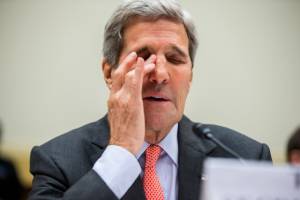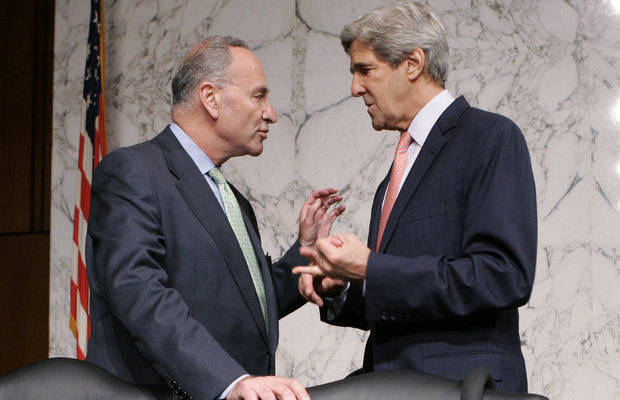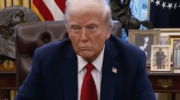
Sen. Chuch Schumer. (Brett Carlsen/AP)
US Secretary of State John Kerry and top Democratic Senator Chuck Schumer wrangled on the Iran nuclear deal and, in particular, the effectiveness of further sanctions on the Islamic Republic. Kerry: If we reject Iran deal, world will lose faith in US leadership. Schumer: If US quits deal, US sanctions will still hurt Iran.
United States Secretary of State John Kerry expressed disagreement on Tuesday with leading Democratic Senator Chuck Schumer on the nuclear deal with Iran, saying there was no way the US could prevent American allies from doing business with Tehran if Congress were to reject the agreement.
Speaking across town in New York, Schumer disagreed and suggested that Washington could still force the world into isolating the Iranians until they made more meaningful concessions.
Even if the US backs away from the deal and other countries lift their sanctions, Schumer said, Iran would continue to feel significant pressure from US penalties. His view sharply contrasts with European leaders who have told US lawmakers that if Congress were to reject the deal, the international sanctions would unravel, undermining global pressure on Iran.
Schumer also said that sanctions aimed at companies that do business with Iran could force US allies and trade partners back to the negotiating table.
“Let’s not forget, those secondary sanctions are very powerful,” Schumer told reporters.
He said the sanctions alert corporations, such as the French oil company Total, that if it deals with Iran, it cannot deal with the US.
“We have that powerful tool, and if used, I think that’s a better, better chance in a very difficult world than an agreement that is so totally flawed,” Schumer stated.
The dispute goes to the heart of the questions that American lawmakers are considering as they prepare to vote on the nuclear accord next month. Schumer said he intended to lobby colleagues to vote with him.
If they vote to shelve the deal — and override an expected presidential veto — they could severely complicate the Obama administration’s ability to honor its commitments to roll back economic sanctions on Iran, supporters of the deal claim.
Republicans are almost universally opposed at this point.
Kerry: Iran Already a Threshold Nuclear Power
Addressing a Reuters Newsmaker event in New York, Kerry took aim at those in Congress who say a better deal could still be reached. That argument would entail the US maintaining or increasing pressure on Iran by threatening foreign governments and businesses trading with Tehran or buying Iranian oil, a strategy that both President Barack Obama and Republicans credit with drawing Iran into serious nuclear negotiations two years ago.
Now that the pact has been finalized, Kerry said such a heavy-handed approach was no longer an option.

Secretary of State John Kerry during a Congress hearing on the Iran deal. (AP/Andrew Harnik)
“Are you kidding me?” he asked the crowd. “The United States is going to start sanctioning our allies and their banks and their businesses because we walked away from a deal? And we’re going to force them to do what we want them to do, even though they agreed to the deal we came to?”
Kerry warned of severe consequences for pursuing such an approach after the agreement had been accepted by Iran and fellow negotiating countries Britain, China, France, Germany and Russia — and endorsed by all 15 members of the UN Security Council.
He said that European governments could walk away from the US-led sanctions strategy against Russia, that the US and Israel would have no support for military action against Iran, if such action were necessary, and he presented an apocalyptic scenario in which the US dollar would lose its status as the reserve currency of the world.
The top American diplomat also challenged those who criticize the length of the deal’s restrictions on Iranian enrichment of material that could be used in nuclear warheads and other elements of its program.
He suggested it was meaningless to worry that Iran would be a “nuclear threshold nation” in 15 years or 20 years, because it has already happened. “They became that while we had a policy of no enrichment,” he said.
If Congress were to vote down the deal, he claimed, the US would lose the moral high ground.
“We will have left Iran free to go do its program, without restraints, without inspections, without knocking down its stockpile, without knowing what they’re doing,” Kerry said.
By: AP and United with Israel Staff

Sign the Petition to Stop a Nuclear Iran
The US Congress must ensure that sanctions against Iran remain in force until the nuclear threat is completely eliminated.
I strongly oppose easing sanctions before the nuclear threat from Iran has been eliminated. Allowing Iran to enrich uranium without being subject to 'anytime, anywhere' inspections is extremely dangerous and unacceptable. Iran's nuclear program must be stopped.
See our Privacy PolicyClick Here to Share the Petition with Your Friends
Click here to locate and contact your Senator.
Click here to locate and contact your Congressman.
Do You Love Israel? Make a Donation - Show Your Support!
Donate to vital charities that help protect Israeli citizens and inspire millions around the world to support Israel too!
Now more than ever, Israel needs your help to fight and win the war -- including on the battlefield of public opinion.
Antisemitism, anti-Israel bias and boycotts are out of control. Israel's enemies are inciting terror and violence against innocent Israelis and Jews around the world. Help us fight back!























